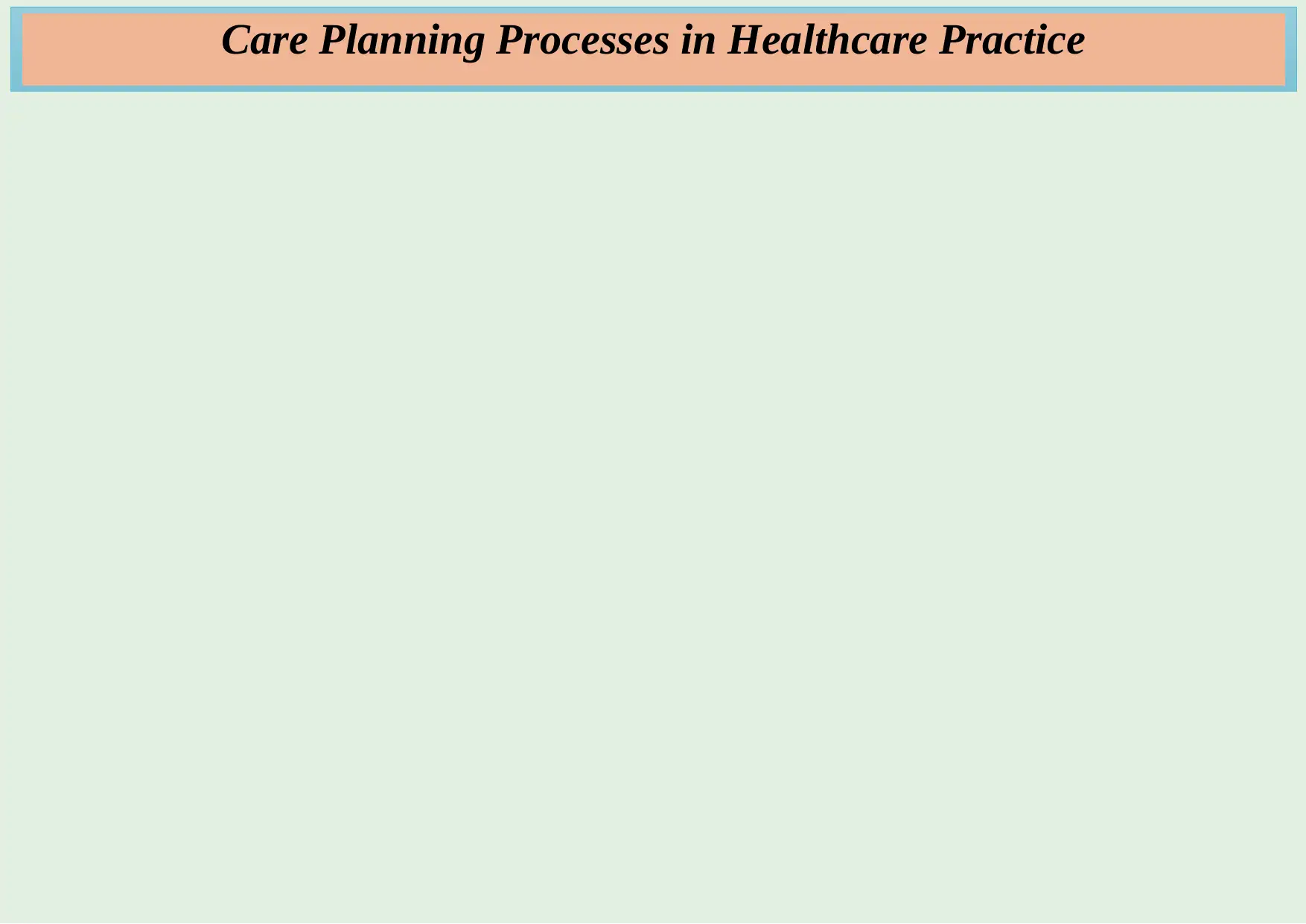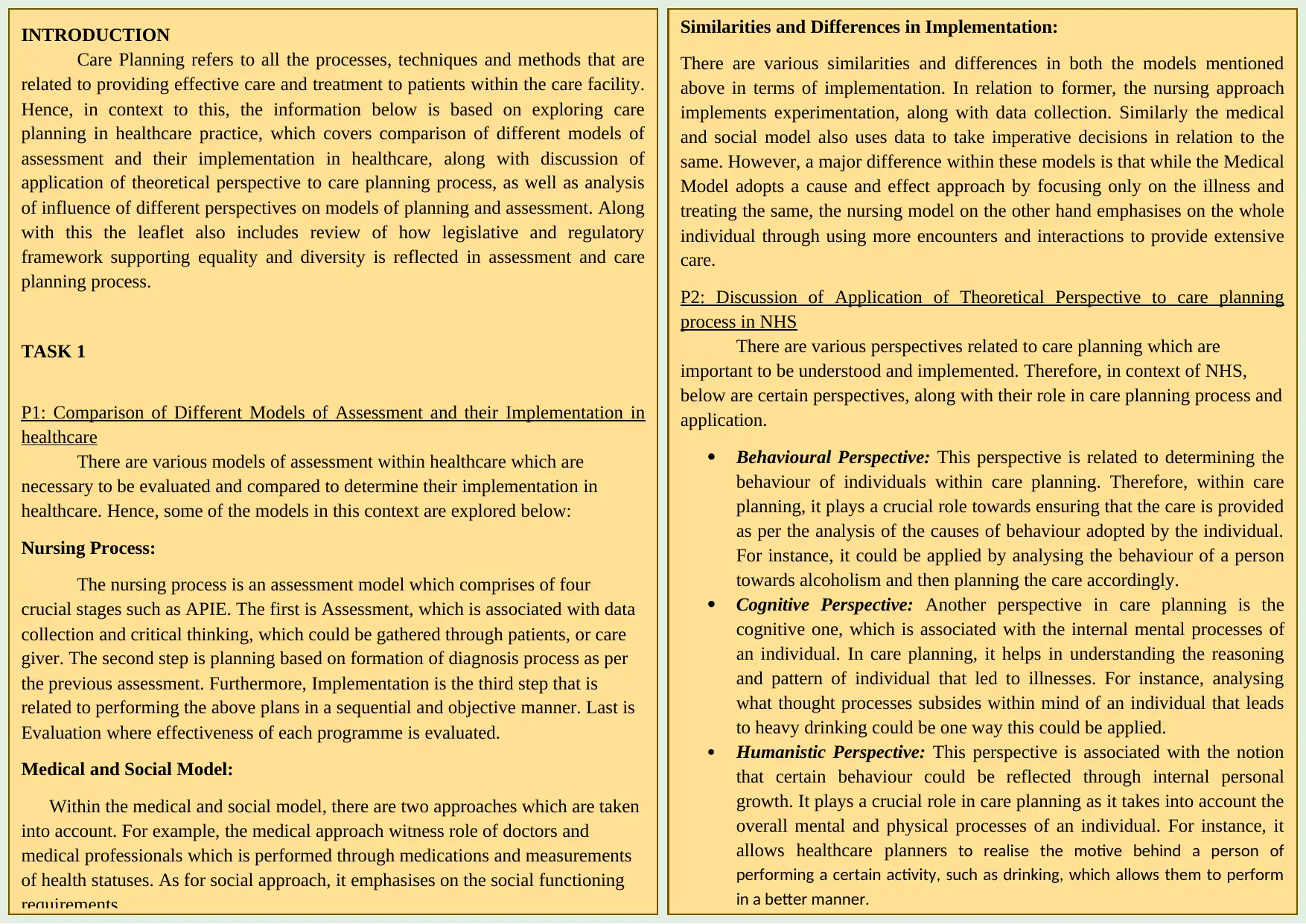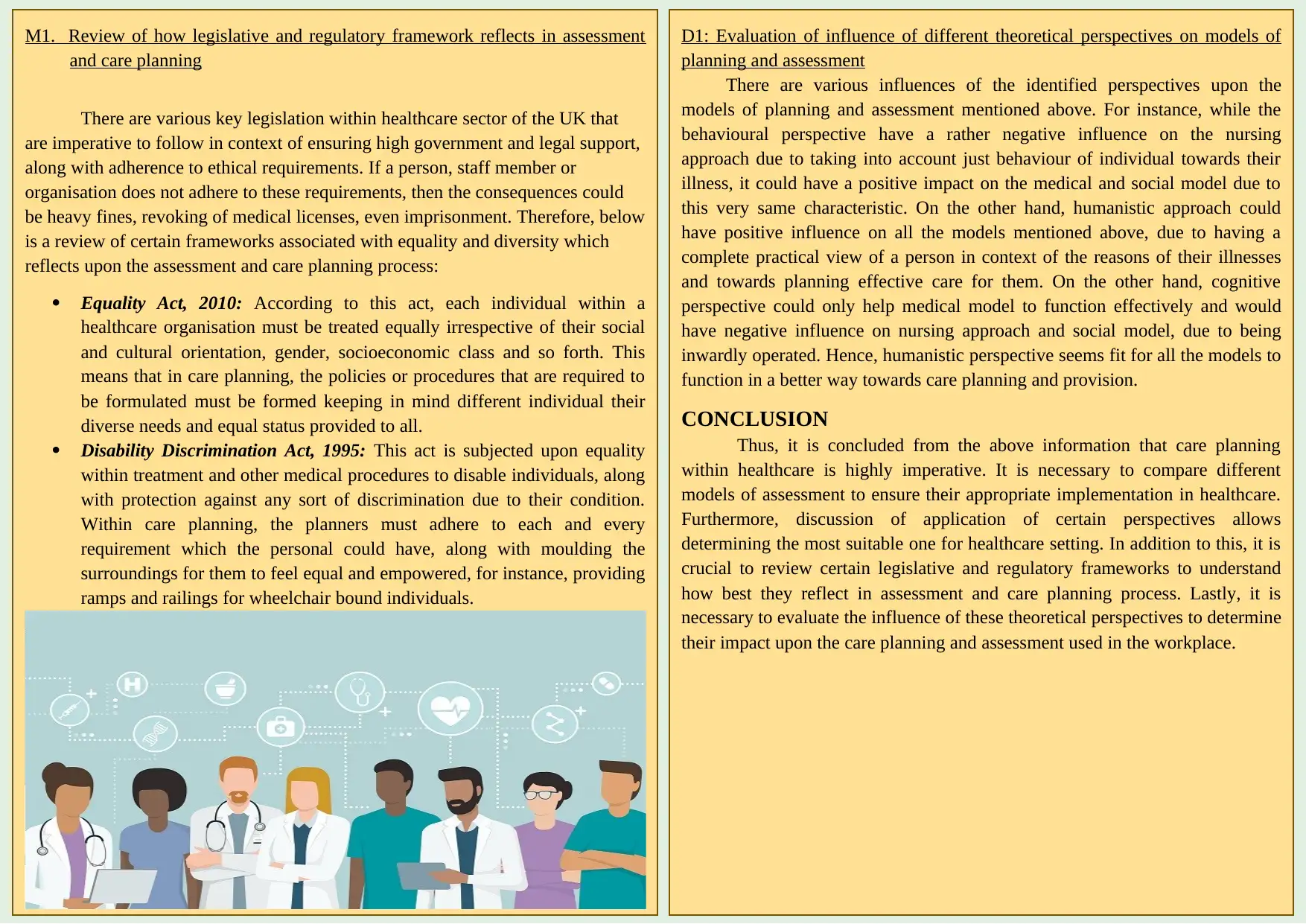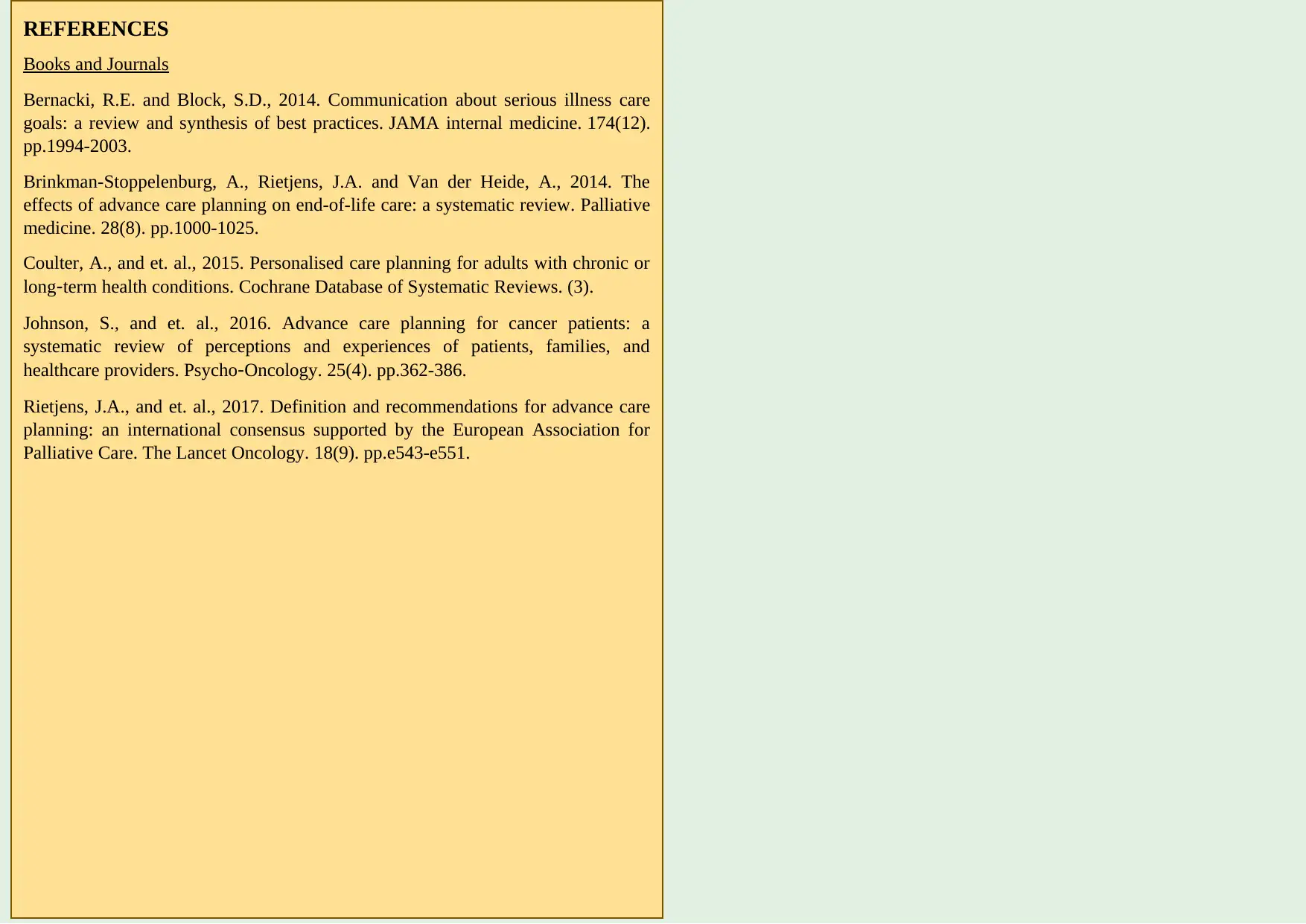Healthcare Care Planning: Assessment and Theoretical Perspectives
VerifiedAdded on 2023/01/11
|4
|1468
|55
Report
AI Summary
This report provides a comprehensive overview of care planning processes within healthcare practice. It begins by comparing different assessment models, highlighting their similarities and differences in implementation. The report then delves into the application of theoretical perspectives, such as the nursing process, medical and social models, behavioral, cognitive, and humanistic perspectives, within care planning in the NHS. Furthermore, it reviews the influence of legislative and regulatory frameworks, including the Equality Act 2010 and the Disability Discrimination Act 1995, on assessment and care planning. The report evaluates the impact of different theoretical perspectives on models of planning and assessment, concluding with a discussion of the importance of care planning in healthcare and the influence of various perspectives on effective care provision. The report utilizes academic sources to support its findings.

`````
Care Planning Processes in Healthcare Practice
Care Planning Processes in Healthcare Practice
Paraphrase This Document
Need a fresh take? Get an instant paraphrase of this document with our AI Paraphraser

Similarities and Differences in Implementation:
There are various similarities and differences in both the models mentioned
above in terms of implementation. In relation to former, the nursing approach
implements experimentation, along with data collection. Similarly the medical
and social model also uses data to take imperative decisions in relation to the
same. However, a major difference within these models is that while the Medical
Model adopts a cause and effect approach by focusing only on the illness and
treating the same, the nursing model on the other hand emphasises on the whole
individual through using more encounters and interactions to provide extensive
care.
P2: Discussion of Application of Theoretical Perspective to care planning
process in NHS
There are various perspectives related to care planning which are
important to be understood and implemented. Therefore, in context of NHS,
below are certain perspectives, along with their role in care planning process and
application.
Behavioural Perspective: This perspective is related to determining the
behaviour of individuals within care planning. Therefore, within care
planning, it plays a crucial role towards ensuring that the care is provided
as per the analysis of the causes of behaviour adopted by the individual.
For instance, it could be applied by analysing the behaviour of a person
towards alcoholism and then planning the care accordingly.
Cognitive Perspective: Another perspective in care planning is the
cognitive one, which is associated with the internal mental processes of
an individual. In care planning, it helps in understanding the reasoning
and pattern of individual that led to illnesses. For instance, analysing
what thought processes subsides within mind of an individual that leads
to heavy drinking could be one way this could be applied.
Humanistic Perspective: This perspective is associated with the notion
that certain behaviour could be reflected through internal personal
growth. It plays a crucial role in care planning as it takes into account the
overall mental and physical processes of an individual. For instance, it
allows healthcare planners to realise the motive behind a person of
performing a certain activity, such as drinking, which allows them to perform
in a better manner.
INTRODUCTION
Care Planning refers to all the processes, techniques and methods that are
related to providing effective care and treatment to patients within the care facility.
Hence, in context to this, the information below is based on exploring care
planning in healthcare practice, which covers comparison of different models of
assessment and their implementation in healthcare, along with discussion of
application of theoretical perspective to care planning process, as well as analysis
of influence of different perspectives on models of planning and assessment. Along
with this the leaflet also includes review of how legislative and regulatory
framework supporting equality and diversity is reflected in assessment and care
planning process.
TASK 1
P1: Comparison of Different Models of Assessment and their Implementation in
healthcare
There are various models of assessment within healthcare which are
necessary to be evaluated and compared to determine their implementation in
healthcare. Hence, some of the models in this context are explored below:
Nursing Process:
The nursing process is an assessment model which comprises of four
crucial stages such as APIE. The first is Assessment, which is associated with data
collection and critical thinking, which could be gathered through patients, or care
giver. The second step is planning based on formation of diagnosis process as per
the previous assessment. Furthermore, Implementation is the third step that is
related to performing the above plans in a sequential and objective manner. Last is
Evaluation where effectiveness of each programme is evaluated.
Medical and Social Model:
Within the medical and social model, there are two approaches which are taken
into account. For example, the medical approach witness role of doctors and
medical professionals which is performed through medications and measurements
of health statuses. As for social approach, it emphasises on the social functioning
requirements.
There are various similarities and differences in both the models mentioned
above in terms of implementation. In relation to former, the nursing approach
implements experimentation, along with data collection. Similarly the medical
and social model also uses data to take imperative decisions in relation to the
same. However, a major difference within these models is that while the Medical
Model adopts a cause and effect approach by focusing only on the illness and
treating the same, the nursing model on the other hand emphasises on the whole
individual through using more encounters and interactions to provide extensive
care.
P2: Discussion of Application of Theoretical Perspective to care planning
process in NHS
There are various perspectives related to care planning which are
important to be understood and implemented. Therefore, in context of NHS,
below are certain perspectives, along with their role in care planning process and
application.
Behavioural Perspective: This perspective is related to determining the
behaviour of individuals within care planning. Therefore, within care
planning, it plays a crucial role towards ensuring that the care is provided
as per the analysis of the causes of behaviour adopted by the individual.
For instance, it could be applied by analysing the behaviour of a person
towards alcoholism and then planning the care accordingly.
Cognitive Perspective: Another perspective in care planning is the
cognitive one, which is associated with the internal mental processes of
an individual. In care planning, it helps in understanding the reasoning
and pattern of individual that led to illnesses. For instance, analysing
what thought processes subsides within mind of an individual that leads
to heavy drinking could be one way this could be applied.
Humanistic Perspective: This perspective is associated with the notion
that certain behaviour could be reflected through internal personal
growth. It plays a crucial role in care planning as it takes into account the
overall mental and physical processes of an individual. For instance, it
allows healthcare planners to realise the motive behind a person of
performing a certain activity, such as drinking, which allows them to perform
in a better manner.
INTRODUCTION
Care Planning refers to all the processes, techniques and methods that are
related to providing effective care and treatment to patients within the care facility.
Hence, in context to this, the information below is based on exploring care
planning in healthcare practice, which covers comparison of different models of
assessment and their implementation in healthcare, along with discussion of
application of theoretical perspective to care planning process, as well as analysis
of influence of different perspectives on models of planning and assessment. Along
with this the leaflet also includes review of how legislative and regulatory
framework supporting equality and diversity is reflected in assessment and care
planning process.
TASK 1
P1: Comparison of Different Models of Assessment and their Implementation in
healthcare
There are various models of assessment within healthcare which are
necessary to be evaluated and compared to determine their implementation in
healthcare. Hence, some of the models in this context are explored below:
Nursing Process:
The nursing process is an assessment model which comprises of four
crucial stages such as APIE. The first is Assessment, which is associated with data
collection and critical thinking, which could be gathered through patients, or care
giver. The second step is planning based on formation of diagnosis process as per
the previous assessment. Furthermore, Implementation is the third step that is
related to performing the above plans in a sequential and objective manner. Last is
Evaluation where effectiveness of each programme is evaluated.
Medical and Social Model:
Within the medical and social model, there are two approaches which are taken
into account. For example, the medical approach witness role of doctors and
medical professionals which is performed through medications and measurements
of health statuses. As for social approach, it emphasises on the social functioning
requirements.

M1. Review of how legislative and regulatory framework reflects in assessment
and care planning
There are various key legislation within healthcare sector of the UK that
are imperative to follow in context of ensuring high government and legal support,
along with adherence to ethical requirements. If a person, staff member or
organisation does not adhere to these requirements, then the consequences could
be heavy fines, revoking of medical licenses, even imprisonment. Therefore, below
is a review of certain frameworks associated with equality and diversity which
reflects upon the assessment and care planning process:
Equality Act, 2010: According to this act, each individual within a
healthcare organisation must be treated equally irrespective of their social
and cultural orientation, gender, socioeconomic class and so forth. This
means that in care planning, the policies or procedures that are required to
be formulated must be formed keeping in mind different individual their
diverse needs and equal status provided to all.
Disability Discrimination Act, 1995: This act is subjected upon equality
within treatment and other medical procedures to disable individuals, along
with protection against any sort of discrimination due to their condition.
Within care planning, the planners must adhere to each and every
requirement which the personal could have, along with moulding the
surroundings for them to feel equal and empowered, for instance, providing
ramps and railings for wheelchair bound individuals.
D1: Evaluation of influence of different theoretical perspectives on models of
planning and assessment
There are various influences of the identified perspectives upon the
models of planning and assessment mentioned above. For instance, while the
behavioural perspective have a rather negative influence on the nursing
approach due to taking into account just behaviour of individual towards their
illness, it could have a positive impact on the medical and social model due to
this very same characteristic. On the other hand, humanistic approach could
have positive influence on all the models mentioned above, due to having a
complete practical view of a person in context of the reasons of their illnesses
and towards planning effective care for them. On the other hand, cognitive
perspective could only help medical model to function effectively and would
have negative influence on nursing approach and social model, due to being
inwardly operated. Hence, humanistic perspective seems fit for all the models to
function in a better way towards care planning and provision.
CONCLUSION
Thus, it is concluded from the above information that care planning
within healthcare is highly imperative. It is necessary to compare different
models of assessment to ensure their appropriate implementation in healthcare.
Furthermore, discussion of application of certain perspectives allows
determining the most suitable one for healthcare setting. In addition to this, it is
crucial to review certain legislative and regulatory frameworks to understand
how best they reflect in assessment and care planning process. Lastly, it is
necessary to evaluate the influence of these theoretical perspectives to determine
their impact upon the care planning and assessment used in the workplace.
and care planning
There are various key legislation within healthcare sector of the UK that
are imperative to follow in context of ensuring high government and legal support,
along with adherence to ethical requirements. If a person, staff member or
organisation does not adhere to these requirements, then the consequences could
be heavy fines, revoking of medical licenses, even imprisonment. Therefore, below
is a review of certain frameworks associated with equality and diversity which
reflects upon the assessment and care planning process:
Equality Act, 2010: According to this act, each individual within a
healthcare organisation must be treated equally irrespective of their social
and cultural orientation, gender, socioeconomic class and so forth. This
means that in care planning, the policies or procedures that are required to
be formulated must be formed keeping in mind different individual their
diverse needs and equal status provided to all.
Disability Discrimination Act, 1995: This act is subjected upon equality
within treatment and other medical procedures to disable individuals, along
with protection against any sort of discrimination due to their condition.
Within care planning, the planners must adhere to each and every
requirement which the personal could have, along with moulding the
surroundings for them to feel equal and empowered, for instance, providing
ramps and railings for wheelchair bound individuals.
D1: Evaluation of influence of different theoretical perspectives on models of
planning and assessment
There are various influences of the identified perspectives upon the
models of planning and assessment mentioned above. For instance, while the
behavioural perspective have a rather negative influence on the nursing
approach due to taking into account just behaviour of individual towards their
illness, it could have a positive impact on the medical and social model due to
this very same characteristic. On the other hand, humanistic approach could
have positive influence on all the models mentioned above, due to having a
complete practical view of a person in context of the reasons of their illnesses
and towards planning effective care for them. On the other hand, cognitive
perspective could only help medical model to function effectively and would
have negative influence on nursing approach and social model, due to being
inwardly operated. Hence, humanistic perspective seems fit for all the models to
function in a better way towards care planning and provision.
CONCLUSION
Thus, it is concluded from the above information that care planning
within healthcare is highly imperative. It is necessary to compare different
models of assessment to ensure their appropriate implementation in healthcare.
Furthermore, discussion of application of certain perspectives allows
determining the most suitable one for healthcare setting. In addition to this, it is
crucial to review certain legislative and regulatory frameworks to understand
how best they reflect in assessment and care planning process. Lastly, it is
necessary to evaluate the influence of these theoretical perspectives to determine
their impact upon the care planning and assessment used in the workplace.
⊘ This is a preview!⊘
Do you want full access?
Subscribe today to unlock all pages.

Trusted by 1+ million students worldwide

REFERENCES
Books and Journals
Bernacki, R.E. and Block, S.D., 2014. Communication about serious illness care
goals: a review and synthesis of best practices. JAMA internal medicine. 174(12).
pp.1994-2003.
Brinkman-Stoppelenburg, A., Rietjens, J.A. and Van der Heide, A., 2014. The
effects of advance care planning on end-of-life care: a systematic review. Palliative
medicine. 28(8). pp.1000-1025.
Coulter, A., and et. al., 2015. Personalised care planning for adults with chronic or
long‐term health conditions. Cochrane Database of Systematic Reviews. (3).
Johnson, S., and et. al., 2016. Advance care planning for cancer patients: a
systematic review of perceptions and experiences of patients, families, and
healthcare providers. Psycho‐Oncology. 25(4). pp.362-386.
Rietjens, J.A., and et. al., 2017. Definition and recommendations for advance care
planning: an international consensus supported by the European Association for
Palliative Care. The Lancet Oncology. 18(9). pp.e543-e551.
Books and Journals
Bernacki, R.E. and Block, S.D., 2014. Communication about serious illness care
goals: a review and synthesis of best practices. JAMA internal medicine. 174(12).
pp.1994-2003.
Brinkman-Stoppelenburg, A., Rietjens, J.A. and Van der Heide, A., 2014. The
effects of advance care planning on end-of-life care: a systematic review. Palliative
medicine. 28(8). pp.1000-1025.
Coulter, A., and et. al., 2015. Personalised care planning for adults with chronic or
long‐term health conditions. Cochrane Database of Systematic Reviews. (3).
Johnson, S., and et. al., 2016. Advance care planning for cancer patients: a
systematic review of perceptions and experiences of patients, families, and
healthcare providers. Psycho‐Oncology. 25(4). pp.362-386.
Rietjens, J.A., and et. al., 2017. Definition and recommendations for advance care
planning: an international consensus supported by the European Association for
Palliative Care. The Lancet Oncology. 18(9). pp.e543-e551.
1 out of 4
Related Documents
Your All-in-One AI-Powered Toolkit for Academic Success.
+13062052269
info@desklib.com
Available 24*7 on WhatsApp / Email
![[object Object]](/_next/static/media/star-bottom.7253800d.svg)
Unlock your academic potential
Copyright © 2020–2026 A2Z Services. All Rights Reserved. Developed and managed by ZUCOL.




